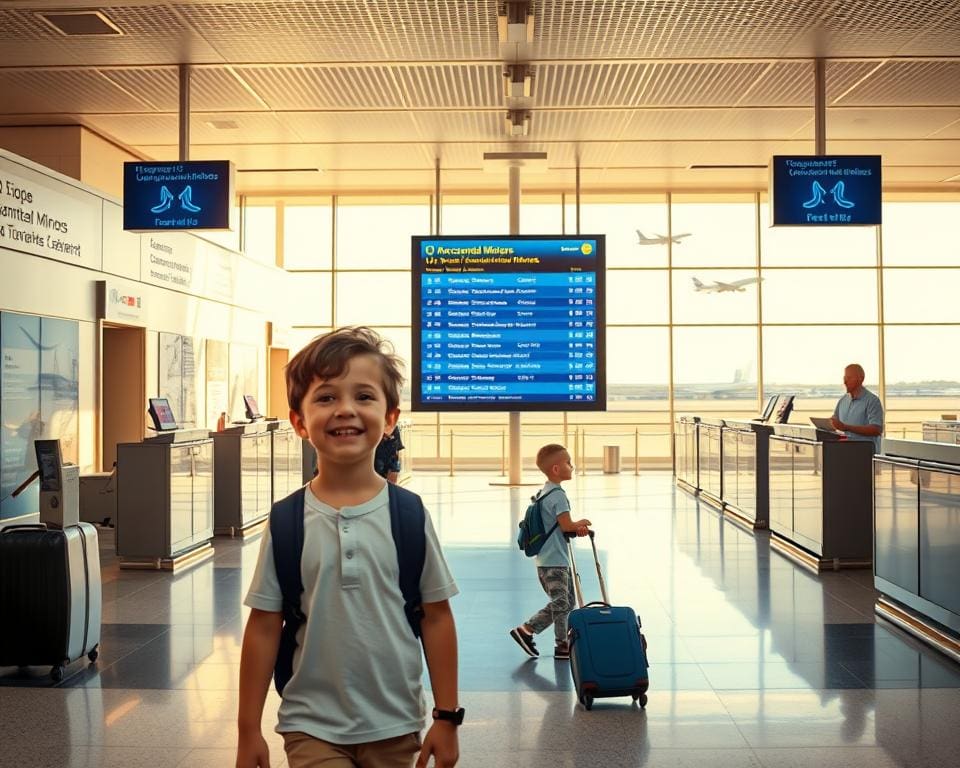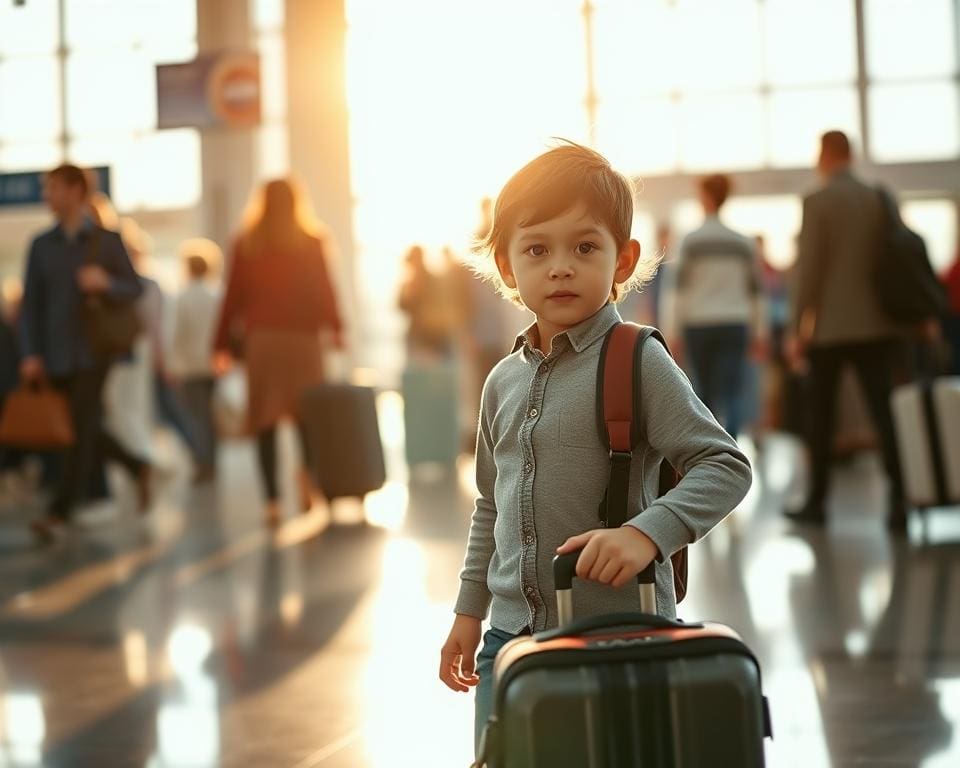As families embark on adventures, the notion of whether a child can travel alone on a plane raises questions and concerns for many parents. In the UK, numerous airlines offer guidelines and support under the unaccompanied minor air travel rules, enabling young travellers to fly solo safely. These policies not only outline age requirements and responsibilities of the airline but also empower parents to facilitate a secure and enjoyable journey for their children. Understanding these regulations is the first step towards embracing the idea of independent travel for the next generation.
Understanding Unaccompanied Minor Air Travel Rules
Understanding the unaccompanied minor air travel rules is vital for parents considering solo flights for their children. Each airline implements specific guidelines that dictate how minors can travel without an adult. These regulations encompass various aspects such as age limits, required documentation, and the procedures in place for ensuring safety and comfort during the journey.
Parents should familiarise themselves with these minor passenger airline policies to make well-informed decisions. Different airlines vary significantly in their definitions of unaccompanied minors, so knowing the distinctions can help avoid any last-minute surprises. For instance, some airlines permit children as young as five years old to fly alone, while others may set a higher age limit.

Common terms associated with these services include fees for unaccompanied minor programmes, which often involve extra costs for the additional supervision provided. It is essential to review these policies closely when booking, as they can significantly influence the travel experience. Understanding these unaccompanied minor air travel rules ensures a seamless journey, prioritising the child’s well-being and security throughout the flying experience.
Can A Child Travel Alone On A Plane?
Many parents ponder the question, “Can a child travel alone on a plane?” Understanding the age requirements for unaccompanied minors is crucial. Regulations differ significantly between airlines, making it essential for guardians to be well-informed before booking a flight.
The Age Requirements for Unaccompanied Minors
The age at which a child may fly alone varies, typically ranging from 5 to 17 years old. Airlines often impose specific rules tailored to their service. For instance:
- Children aged 5-11 usually require unaccompanied minor services.
- Those between 12-15 may fly alone with or without additional supervision.
- Most airlines allow teenagers aged 16-17 to travel unaccompanied without special arrangements.
It is vital for parents to confirm the age requirements for unaccompanied minors with the chosen airline ahead of time.
Different Airlines’ Policies on Unaccompanied Minors
The different airlines’ policies regarding unaccompanied minors can encompass various aspects beyond just age. Some of the common differences include:
- The level of supervision provided during the flight.
- Meal services offered to unaccompanied minors.
- The maximum number of unaccompanied minors allowed to travel on a single flight.
Understanding these aspects will aid parents in preparing their child for the journey ahead. Knowing that airlines have diverse protocols can help minimise any potential anxieties pertaining to flying alone.
Children Flying Solo Regulations
When considering the journey of young travellers, parents must be aware of essential children flying solo regulations. These guidelines not only ensure safety but also contribute to the overall travel experience of children. Preparing your child for solo travel is paramount to instilling confidence and managing expectations.
General Guidelines for Young Travellers
Before embarking on a flight alone, it is crucial to discuss the journey with your child. Communication plays a significant role in making them feel secure. Some guidelines include:
- Inform your child about the airport processes, such as check-in, security screenings, and boarding.
- Review the seating arrangements and how to locate staff members if they need assistance.
- Discuss any layovers or transfers they might have to navigate.
Preparing Your Child for Solo Travel
As part of preparing your child for solo travel, it is wise to address various travel scenarios. Preparation should cover essential packing items, ensuring they have:
- A small backpack with snacks, entertainment, and any necessary items.
- A list of critical contact information, including family members and emergency contacts.
- Clear instructions on how to handle unexpected situations, like missing a connection.
Empowering your child with knowledge will help them embrace the adventure of flying alone.
Kid Solo Traveller Guidelines
Understanding the requirements for young travellers is essential for a successful journey. Familiarising oneself with the kid solo traveller guidelines assists in ensuring that everything runs smoothly. The documentation needed for unaccompanied minors typically involves several key documents that serve to verify the child’s identity and authorise their travel.
Documentation Needed for Unaccompanied Minors
Parents and guardians must be prepared with the necessary documentation to facilitate the travel of unaccompanied minors. The essential paperwork includes:
- Identification: A valid passport or an alternate form of ID is required, depending on the destination.
- Consent Form: An official consent form signed by a parent or guardian. This document outlines the permission for the child to travel alone.
- Itinerary: Details of flight arrangements including departure and arrival times, as well as any layover information.
- Contact Information: Emergency contact details for parents or guardians, including phone numbers and addresses.
Reviewing and preparing these documents ahead of time minimises the risk of complications during check-in or boarding. This preparation ultimately creates a more positive departure experience for both the child and their family, making solo travel an exciting venture rather than a stressful experience.
How Airlines Manage Unaccompanied Minors
The airline management of unaccompanied minors involves comprehensive strategies to ensure a safe and comfortable travel experience. Airlines implement extensive training for staff who directly interact with young travellers, ensuring that they are equipped to address any situations that may arise during the journey. This specialised training not only focuses on safety but also emphasises communication skills to foster a reassuring environment for minors.
Secure check-in procedures play a vital role in the airline management of unaccompanied minors. Airlines often require parents or guardians to complete specific documentation, ensuring that all necessary information is collected and stored securely. This meticulous process allows the airline to track the child’s travel from departure to arrival effectively.
Designated personnel are assigned to accompany unaccompanied minors through each stage of their journey. These staff members are responsible for monitoring minors from the moment they arrive at the airport until they are handed over to the designated adult at their destination. Such measures provide peace of mind for families, allowing them to stay informed about their child’s progress and well-being throughout the flight.
Effective communication with parents or guardians remains a cornerstone of the airline management of unaccompanied minors. Airlines often establish contact during the journey, providing updates via text or calls, ensuring that families remain connected during this crucial time.
Flying Alone Underage Rules
When considering flying alone underage rules, it’s vital for parents to understand the regulations that protect young travellers. Each airline has its own policy that outlines the responsibilities they uphold when a child flies unaccompanied. These rules ensure that children remain safe and secure throughout their journey.
Many airlines offer specific services dedicated to unaccompanied minors. These services include designated staff to escort children through check-in, security, and boarding procedures. Understanding these measures can provide parents with reassurance about their child’s security during the flight.
Legal aspects are also crucial when contemplating flying alone underage rules. Laws may vary by country and airline, placing obligations on airlines to create a safe environment for minors. In the United Kingdom, airlines typically require certain documentation, including identification and, in some cases, parental consent forms. These documents serve to verify the child’s identity and address any potential legal considerations.
As a parent, being informed about these flying alone underage rules becomes fundamental. It allows you to prepare your child emotionally and mentally for their journey while ensuring that all safety precautions adhere to regulations set forth by the aviation authorities.
Ensuring Safety and Comfort for Young Travellers
When considering a young traveller’s journey alone, prioritising their comfort and well-being is essential. Communication with cabin crew serves as a cornerstone in ensuring safety during the flight. Parents should strive to communicate openly with the flight staff, outlining their child’s unaccompanied status. This interaction allows the crew to provide the necessary support and reassurance, creating a nurturing environment for young flyers.
Communication with Cabin Crew
Before the flight, parents can facilitate effective communication with cabin crew by making them aware of their child’s age and any specific needs. This helps the crew to monitor the child throughout the flight and offer assistance as required. Encouraging children to interact with cabin crew members fosters a sense of security, enhancing their flying experience.
Pre-flight Preparations for Parents
Pre-flight preparations play a significant role in ensuring safety for young travellers. Parents should equip their children with important information regarding the journey, such as the flight details and emergency procedures. Engaging in practice conversations about what to expect in the airport and on the plane can alleviate any anxiety. Parents might consider the following preparations:
- Discuss travel expectations, including security checks and boarding protocols.
- Encourage children to memorise essential contact information.
- Prepare a small kit with snacks, books, or toys to keep them entertained during the flight.
These steps contribute to ensuring safety, fostering a sense of independence while travelling alone.
Tips for a Successful Solo Flight Experience
Preparing your child for their journey is crucial to ensure a successful solo flight experience. Encourage young travellers to manage their time effectively at the airport by arriving early, allowing them the chance to explore and acclimatise to the environment. Familiarising themselves with airport signage and procedures can significantly reduce anxiety, making the entire experience more enjoyable.
During the flight, retaining a calm demeanour is essential. Teach children simple breathing techniques to help alleviate any nerves they may feel. Moreover, they can engage with fellow passengers by initiating conversation, potentially making new friends along the way. These small interactions are not only fun but can also enhance their sense of independence and confidence during solo journeys.
Finally, packing a bag filled with favourite books, games, or snacks can transform the flight into an enjoyable experience. It’s also wise for parents to create a check-list of items to bring, ensuring children feel prepared. With these practical tips for a successful solo flight experience, young travellers are set to embrace their adventures with enthusiasm and self-assuredness.









